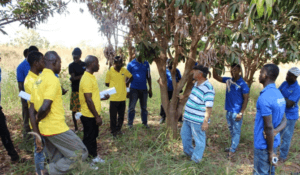TRAQUE extends support to mango farmers in northern Ghana
 The European Union funded Trade Related Assistance and Quality Enabling Programme (TRAQUE), has embarked on an extensive good agricultural practices training for mango farmers in the Northern and Upper East Regions.
The European Union funded Trade Related Assistance and Quality Enabling Programme (TRAQUE), has embarked on an extensive good agricultural practices training for mango farmers in the Northern and Upper East Regions.
Farmers in Salaga, Tamale, Yendi, Walewale, Bimbilla, Navrongo and Damango who took part in the training programme were taken through both theory and practical ways of commercial mango production.
The theory aspect dealt with traceability and food safety while the field experience dealt with pruning and the correct application of pesticides and fertilizers.
The Team Leader of TRAQUE, Mariella Sandini told farmers at one of the training workshops in Salaga that to improve mango quality and expand into the global market, it was important to abide by the best practices and modern trends in farming.
She said it was in this direction that the decision was taken to organise the training programmes for them.
Over the past five years, commercial mango production had increased in the northern part of Ghana with more than 5,000 acres under cultivation.
However, yields are very low and none of these farmers are able to export their produce after harvesting due to the huge gap in knowledge on current farming trends and lack of resources.
President of the Savannah Mango Growers Association, Alhaji Mohammed Zakari expressed the hope that the TRAQUE intervention would help farmers reverse the trend.
“The good thing about this TRAQUE training workshops are that the previous trainings we have had were only focused on theories. But this one is more practical. If we get this kind of trainings consistently for two years, our farmers will be ready to export their mangoes,” he said.
Currently, majority of the mango farmers in northern Ghana sell their produce on the local market.
Alhaji Zakari said since the formation of the Association only one of the farms had been able to export, which he described it as “worrying trend we want to correct because when you export, it brings more income to the farmer than the local market”.
Mr Aoun Bassam George, lead trainer of the farmers, expressed optimism that the workshops would impact positively on the farmers.
“They will be able to improve on their quality and produce better mangoes. They will also be in a position to increase their yield per acre.
“The mango industry in Ghana has not performed well on the international market in recent times. Though there have been some massive individual investments made in the sector, the statistics are nothing to write home about therefore the need to increase the knowledge of farmers to boost productivity,” he added.
It is estimated that Ghana has more than 10,000 acres under mango production at present, which can produce 15,000 metric tonnes. The current average yield in Ghana is estimated at 3.6 metric tonnes per acre.
Abdul Rahim Abdallah at the Department of Agriculture in Bimbilla was full of praise for TRAQUE in organising the trainings.
“A lot of us in the Agriculture Department need capacity building on modern ways of farming so this upgrade of our knowledge in these workshops will automatically help us to educate the farmers in our districts,” he said.
With a 15 million Euro funding from the European Union, TRAQUE is committed to the safety and standards of fruit and vegetables production in Ghana. The Programme is also committed to helping Ghanaian farmers access the EU market with safe and quality goods
Source: GNA
